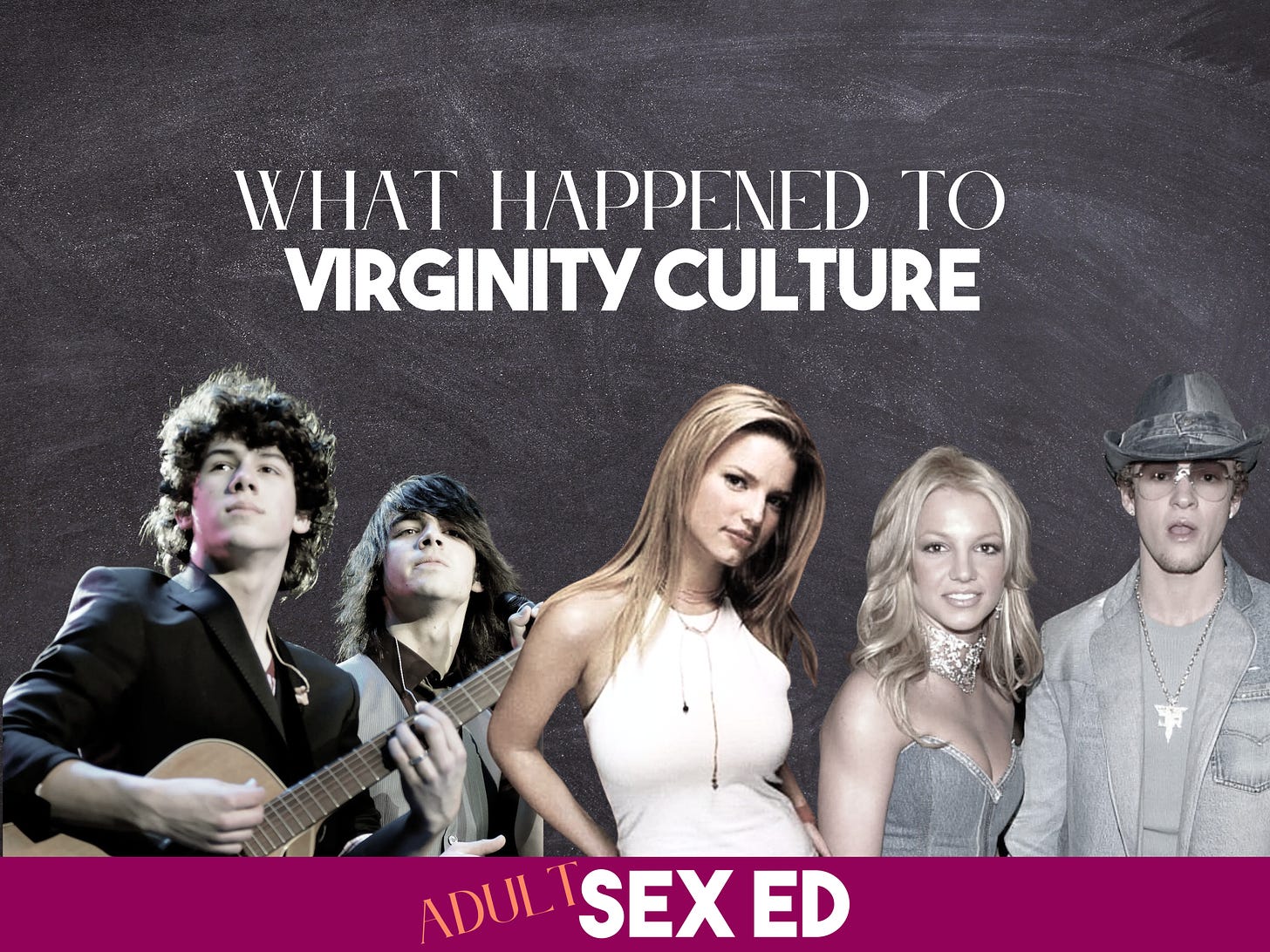Hi Everyone,
Happy hump day and thanks so much for reading the ADULT SEX ED newsletter! Reminder: the next ADULT SEX ED live show is TOMORROW 6/22 in NYC! Special guests include Dylan Adler, Gabe Mollica, and Katie Haller.
This is a weekly newsletter from me, Dani Faith Leonard, a comedian and film producer (you can follow me on instagram). It’s an extension of the live comedy show ADULT SEX ED that I’ve hosted since 2018. The show and this newsletter is about plugging the holes in our education as adults (if you want to know more, here’s a description on substack).
Ready to get a little smarter? Okay, let’s go!
Dani
I just finished watching Shiny Happy People: Duggar Family Secrets, a new documentary series on Amazon Prime. The docuseries isn’t just a deep dive into the Duggar family, the reality TV stars known for having nineteen children, their Baptist views, conservative dress, and retrograde gender roles. It uses the Duggars to dig into the larger story of the Institute in Basic Life Principles, which was founded in 1961 by Bill Gothard.
I was particularly interested in the wisdom booklets, homeschooling materials that consist of a subpar education and, of course, their own version of sex ed. Gothard’s teachings include that girls and women have “eye traps,” characteristics that inspire uncontrollable urges in men. Oh my! The father owns the decision-making power in the family and sexual purity is stressed. Gothard ended up being brought down by sexual assault and harassment charges, naturally, although he remains a free man.
This emphasis on sexual purity may seem out of place today, but it reminded me of a really specific time in my adolescence when virginity culture (and all things purity) entered the mainstream. In the late ‘90s and early aughts, the federal government funded abstinence-focused education and organizations that promoted purity pledges. It was at this time that peak virginity culture mixed with Christian influence, and influenced pop-culture.
THE POP STARS
When Britney Spears first exploded on the scene, female pop stars were expected to be “pure.” Britney was highly sexualized, but very publicly claimed to be a virgin. On the flip side, when Christina Aguilera released the song “Dirty,” TIME Magazine said she looked like she came from an "intergalactic hooker convention." Britney was questioned incessantly about her virginity and when she admitted that she had sex with her then ex-boyfriend Justin Timberlake, she was blasted in the media (his career was just fine). Jessica Simpson’s virginity was also the talk of the town, but when she publicly lost her virginity, it was fine because she did it “the right way” — to her husband and on reality television.
In the years after purity culture ruled over female pop-stars, virginity pledges were most associated with Disney stars. Miley Cyrus, Demi Lovato, and Selena Gomez were all part of the chaste trend. The poster boys were the Jonas Brothers, who wore purity rings and took a vow of abstinence through marriage. (They finally made fun of their purity ring past on Carpool Karaoke in 2019.)
THE PLEDGES
The temperance movement arose in the 18th century in America. The Woman's Christian Temperance Union (WCTU), encouraged people to sign abstinence pledges promising to not use alcohol or other drugs. When the federal government funded abstinence-based sex education, it lead to the spread of programs that involved sexual purity pledges.
The first program that encouraged individuals to sign a pledge encouraging abstinence from sexual intercourse until marriage was True Love Waits, started in 1993. The True Love Waits pledge states: "Believing that true love waits, I make a commitment to God, myself, my family, my friends, my future mate and my future children to be sexually abstinent from this day until the day I enter a biblical marriage relationship." Sounds fun! From the mid ‘90s through the early aughts, over 2.5 million Americans took this pledge. Another program was Silver Ring Thing, which promoted purity rings and chastity pledges with the help of federal funding.
Leslee Unruh founded the Abstinence Clearinghouse, which sounds like Lumber Liquidators for people with intact hymens. She also runs fake abortion clinics, or “pregnancy crisis centers,” in South Dakota. She has hosted conferences with oh-so-clever names like “Lights, Camera, No Action.” Most importantly, she produces one of the largest purity balls of the year.
Writer Jessica Valenti (here’s her substack) dissected purity balls in her book The Purity Myth. At purity balls, daughters and their father figures exchange vows and rings, pose for photos, and dance the night away (with limited rhythm, I assume). At some of these balls, fathers take an oath to be the keeper of their daughter’s virginity until she gets married. So it’s basically like my bat mitzvah except instead of becoming a woman of my own volition, I would be pledging my virginity to the control of my closest male relative.
THE IMPACT
Although virginity pledges in pop-culture peaked years ago, the organizations behind them are still around today. Silver Ring Thing was sued by the ACLU and now operates under the name Unaltered Ministries. True Love Waits is still around, too.
Purity culture attaches shame to sex, also isolating sexual assault victims in the process. According to a study published in 2005 in the Journal of Adolescent Health, 21% of young adults who had taken the pledge had vaginal intercourse, 13% reported having practiced oral sex and 4% anal sex. Overall, 88% of purity pledgers had premarital intercourse and were 30% less likely to use protection because let’s face it - why did they think they ever needed to learn about it.
Of course, virginity (or purity) is also just a social or religious construct. Purity pledges and purity balls are not actually about chastity — they’re about control. A family structure where a father “owns” his daughter’s virginity and decisions also teaches women that they can’t trust themselves to make decisions of their own.
Personally, I grew up on Long Island in Billy Joel territory, where I didn’t hear much about purity pledges, purity rings, or purity balls. But in the late ‘90s and early aughts when I was in school, virginity culture was all around. When a rumor spread in my town that I had slept with a teacher, it seemed like the worst thing that could happen. The closest I had ever come to sex was when some kid pushed an accidental boner into my lower back during the massage circle before the high school musical.
While purity culture would have dictated that I take a pledge and publicly state my virginity, I went in a different direction. At the school talent show, I bribed the janitor to swap out my music and I performed “Like a Virgin” instead, with the full support of my parents (I told this story on the Risk! Podcast HERE) . Sure, I freaked out a mom who brought her girl scout troop and I was suspended from school. But I walked away knowing that nobody else owned my narrative, or my decisions. If only Britney had been that lucky.
RELATED NEWSLETTERS
If you liked this newsletter, here are some others you might like:









Also, who won the Courting vs. Betrothal is more Godly square off? i.e. Bill Gothard vs. Jonathan Lindvall.